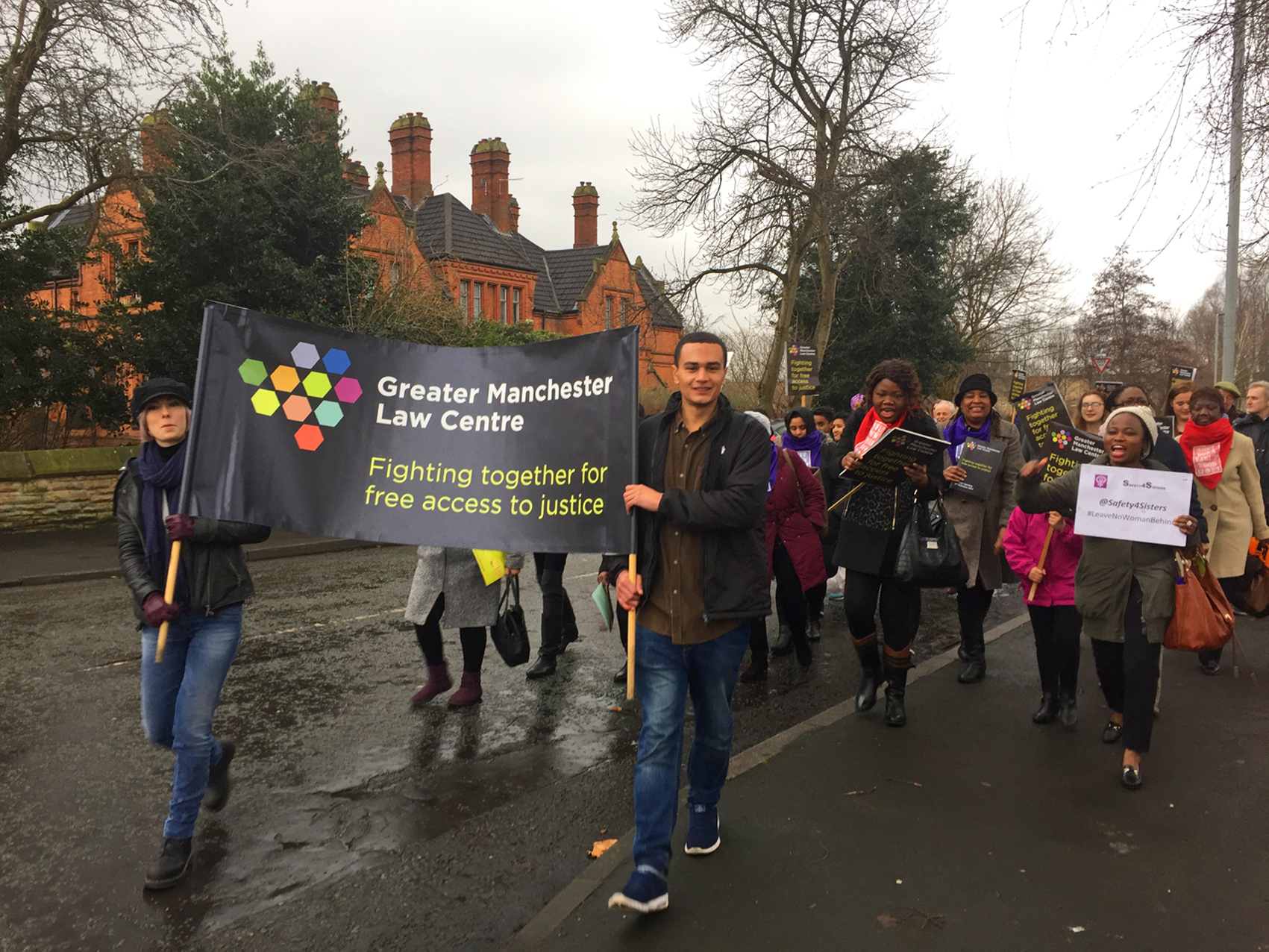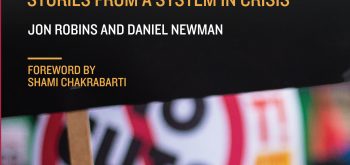How to build your own law centre
 In February this year, Greater Manchester Law Centre opened its doors to the public. ‘We aren’t just a law centre, but a campaign for law centres,’ says chair John Nicholson. Here, he explains how they did it – and how you can too
In February this year, Greater Manchester Law Centre opened its doors to the public. ‘We aren’t just a law centre, but a campaign for law centres,’ says chair John Nicholson. Here, he explains how they did it – and how you can too
Legal aid has been cut and cut again. The government wants to prevent access to justice and does so by removing advice agencies that can help those most in need. Both national and local government have sought to rely on the internet or call centres for meeting the advice needs of the poor and vulnerable. Advisers know that the complexities of welfare rights and benefits, among other areas of advice, demand face-to-face advice.
It has become harder and harder for young people to become social welfare lawyers because of a double whammy of crippling student debt and fewer job opportunities.
Locally, the Legal Aid Agency and Manchester Council finally succeeded in closing South Manchester Law Centre in 2014, despite four years of campaigning and two (successful) judicial reviews. Those of us involved said that this downward spiral could not be allowed to continue.
We declared publicly:
‘With your help there WILL be a law centre for Greater Manchester.’
And now there is.
 A full version of this article appear in the latest issue of Proof Life in the Justice Gap: Why legal aid matters.
A full version of this article appear in the latest issue of Proof Life in the Justice Gap: Why legal aid matters.
Proof is the print magazine of the Justice Gap. The latest issue features contributions from Helena Kennedy QC, Martha Spurrier, Lord Tony Gifford QC as well as journalists including the Guardian’s David Conn and Rebecca Omonira-Oyekanmi who has written an extended article reporting from the frontline of the legal aid cuts. The cover and Rebecca’s article is illustrated by the award-winning artist Simon Pemberton.
ORDER HERE.
We aim to ensure that face-to-face advice – free, independent and of high quality – is available for residents of each of the 10 boroughs making up Greater Manchester.
This article isn’t a ‘how to do it’ for everyone. Greater Manchester has specific characteristics. It is an area that is disproportionately poor – child poverty rates are some of the highest in the country.
There were once nine law centres in the county. Given that the ratio of law centres to population has never been more than about one to 1,000,000, Greater Manchester may have been three times better off. But now there are just two small law centres remaining in Bury and Rochdale). The inner-city area covering Salford, Manchester and Trafford became a ‘law centre free zone’.
This is at a time when people desperately need advice to combat vicious benefit sanctions, home lessness as Manchester has become a dystopian trend-setter evicting homeless people from the increasingly glitzy streets lining the council’s much vaunted ‘vertical communities’, ill treatment at work and all the complications of the endlessly changing benefit and immigration regulations.
If you are thinking of setting up free, independent, high quality legal advice and representation for those most in need, not everywhere has to contend with our particular mix of factors. But our stand against the cuts and closures may encourage others and, we hope, the following may help. After all, if we can do it here, against these odds, so can you.
 1. HARNESS THE POWER OF PROTEST
1. HARNESS THE POWER OF PROTEST
We started as a campaign. We weren’t going to take it anymore. As the last co-ordinator of South Manchester Law Centre put it at our first public meeting: ‘We have to do something’. We didn’t actually have much, if any, idea of what would happen next – but it was and is vital that this spirit of resistance flowed through everything we did.
2. DRAW ON YOUR EXPERIENCE
The individuals involved initially had all been active in one or more of the following campaigns: Access to Advice national conferences held in Manchester between 2010 and 2015; defending South Manchester Law Centre against closure 2010-14; campaigning against the LASPO legal aid cuts; delivering ‘pro bono’ advice; managing voluntary organisations (including law centres, the Greater Manchester Immigration Aid Unit, North West HIV services); giving advice through Unemployed Worker Centres, set up by the local trade union movement; and – last but not least – FC United of Manchester which was set up by football supporters opposed to the PFI-style takeover of Manchester United.
3. FORM A STEERING GROUP
We agreed that we needed a constitution. We had, almost without blinking or thinking, become drawn into setting up the law centre and managing it. To be a ‘law centre’ it is necessary to be a ‘full member’ of the Law Centres Network. Greater Manchester Law Centre currently has ‘observer status’.
4. HAVE A VISION
Probably the best thing that could have happened to us at this point was the realisation that we needed to develop the idea and see what was possible – rather than simply start trying to get a service up and running without thinking it through. What should a Greater Manchester Community Law Centre look like? To some extent this remains a concept under development. For example, can legal advice be provided ‘virtually’? Does a law centre need a building? If so, does it need a building in each of the 10 districts? Are we campaigning for advice – or ‘legal’ advice?
One suggestion was that it was a mistake to call ourselves a ‘law centre’ at all, as the name had become tarnished and funders didn’t like it. Our response was that our very existence was a challenge to the closures of the previous law centres and so it mattered that we said loud and clear that we were a ‘law centre’. We established an advisory group to draw together lawyers, academics, student welfare rights advisers and other voluntary organisations, to oversee the law centre’s development. This was sufficiently successful to get our welfare appeals service going with volunteer advisers supervised by specialist supervisors from local law firms. We started by prioritising advice and representation in benefits and employment because we reckoned that they were the areas worst hit by the legal aid cuts.
We then realised that we needed another group, a legal academic services board, to bring together university law departments and law schools to maximise the deployment of volunteer students representing people at work assessment appeals.
5. DEVELOP YOUR VISION
It is notable that the charitable trusts most willing to consider assisting us are precisely those who like us because we are campaigning. It is a tribute to the Tudor Trust that they were immediately prepared to take a punt on us (we and they both know it) and funded a development worker post. Then we were luckier still. We were able to appoint two part-time workers as a job share. Together they gave us a range of skills: developing links with universities, promoting us online and through Twitter (as if we had even heard of Twitter), starting the dialogue with funders large and small, finding us premises, encouraging volunteers and crowdfunding. These two workers also developed strong links with other law centres around the country and gained the support of the Law Centres Network.
 6. BUILD YOUR PROFILE
6. BUILD YOUR PROFILE
This may not be for everyone, but we decided to have patrons. Within a very short time, we received enthusiastic support from leading lawyers including Michael Mansfield QC and John Hendy QC, the actress and as-seen-on-TV QC Maxine Peake, shadow spokesman Lord Willy Bach and long-term Moss Side legal aid lawyer Robert Lizar. Later we were joined by community activist Dr Erinma Bell and local academic Dawn Edge.
7. SPIN THE PLATES
Financial support and investment, governance, compliance and day-to-day management. Without services, you don’t get funding. Without funding, you can’t get premises. Without premises, there aren’t any services. The trick is to
get all the plates spinning at once. Developing a service without a supervisory solicitor, insurance, computer systems or advice manuals is now for regulatory reasons impossible. But even before we were open, we received phone calls from people looking for help. One caller was referred to us by the police. They had lost their coat. Managing a building can take over everything else. You forget you are trying to deliver services (never mind campaigning) because you need to deal with utility companies, alarm services, intercom, security, lift – and the list goes on. You also need to find, induct, train and manage volunteers.
8. SORT OUT THE MANAGEMENT
This puts a huge strain on the volunteer management. A few very committed people have had to take on managerial responsibilities in order to set up some services, attract solicitors willing to carry out sessions, organise volunteers – and at the same time as applying to funding bodies. Our immediate priorities were to get funding and appoint the best possible supervising solicitor and development manager to ensure that what we have set up can be delivered and managed – and we have done so. Volunteers are the backbone, but you must have high quality paid management.
9. BE SUSTAINABLE
Simply speaking, it would be a mistake to appoint a solicitor/ manager who just found themselves advising clients and hoovering the waiting room.
We need to be sustainable. Our Lawyers Fund Generation Scheme aims to get all lawyers in private practice in the area to donate 0.5% of their income to the law centre (or at least to the voluntary sector). This is very popular – especially with non-lawyers. For the future the links with local universities and law colleges need to develop into support for the law centre and the recruitment of students to represent people in work assessment tribunal appeals. Individual and smaller scale fundraising needs to become routine, managed by volunteers. The volunteers themselves need to be coordinated. Outreach offices need to be identified, so that case workers can deliver advice to local people outside, who don’t live near the conurbation centre.
10. BE PART OF THE COMMUNITY
We are proud to be based in Moss Side at 159 Princess Road, Manchester M14 4RE. We are keen to see this as a local community hub, not just for individual advice-giving but for community concerns to be raised and action taken. Crucially we needed community support to set up. We held two local public meetings in Moss Side before we moved in to see if people were in favour. They were – unanimously. The local newsagent will not let us pay for milk when we go into the shop, and the Nubian coffee shop delivers us patties and drinks. There were over 500 people who attended our opening event in February, held at the nearby West Indian Sports and Social Centre. There was a short march with banners and placards from the centre itself, where Robert Lizar and Erinma Bell cut a ribbon saying, ‘No Access to Justice’, with the declaration: ‘There WILL be access to justice, here, because we say there will.’
After this, Michael Mansfield made the case for more community-led law centres and Maxine Peake called for freedom and justice for all, as the Holy Name primary school steel band and the WAST (Women Asylum Seekers Together) choir entertained us.
This article was first published on July 21, 2017







